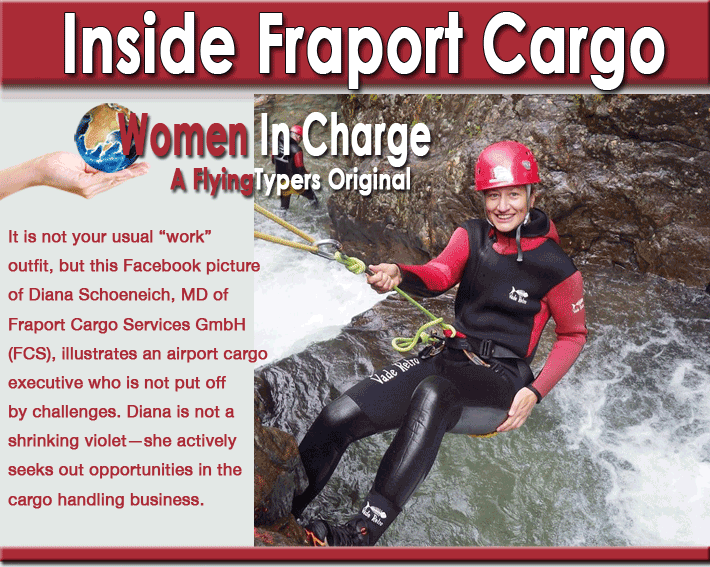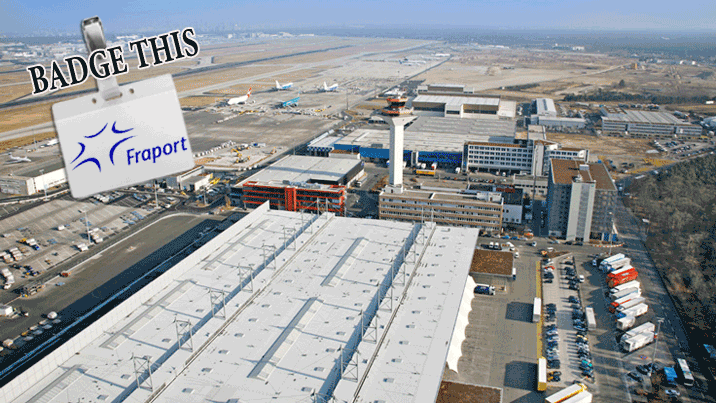Inside Fraport Cargo

Frankfurt
Am Main continues as number one airport both in terms of passenger and
cargo traffic in Germany and is also the second busiest airport in Europe.
The slogan “Managed by FRAPORT”
already suggests that FRA prizes itself for its experience in running
airports and airport-related business.
The present, however, is not without difficulties.
Costs Rising
For decades the “Flughafen Frankfurt
– Main AG,” as it was then called, carried out all functions
by themselves and had a de-facto monopoly on handling (only other self
handlers permitted by law were German flag carrier Lufthansa and, as
a remnant from the post-war Allied Occupation Statute, Pan Am).
This changed when the process of European integration
moved ahead in the late 1990s.
To be competitive in this new environment,
FRAPORT decided to outsource a number of activities—such as cargo,
de-icing, and the like—to 100 percent subsidiaries.
Subsequently, all cargo-related activities
were transferred to FCS, FRAPORT Cargo Services GmbH.
So we wonder how has the FCS scheme worked
out?
FlyingTypers spoke to FCS customers
and most commented that while FCS may not be the least costly option,
it’s the one delivering a good service. Opinions vary between
“reasonable” and “superb,” but indeed there
was uniform consent between operator staff that FCS stronghold is their
experienced and well-trained workforce that can “get almost anything
done.”
Since competition airside is limited—only
one more company offers cargo loading and unloading in FRA and restricts
itself to passenger aircraft; even Lufthansa Cargo contracts FRAPORTs
ramp services on their home base—the naturally shorter communication
channels between FRAPORT and their 100 percent subsidiary FCS make for
some efficiency gains.
Still, price is an important criterion
when choosing handling partners, and adapting to the market demands
has proven particularly challenging for FCS.
FCS points out that the margins in the
handling business are minuscule and require huge investments in infrastructure.
It’s especially the infrastructure provided for by FCS and FRAPORT
that attracts the large cargo operators.
Issues
Incoming
Another issue is the payment—invoices
(which often amount to several 100K Euros) are often paid with considerable
delay or sometimes even rejected because of minimal errors (such as
charging FCS-supplied tie down material while the operator’s own
supplies were actually used), a measure Ms. Schoeneich called “unfair.”
FCS has also lost—and written off—a
“six-figured Euro amount” on handling charges owed by Air
Cargo Germany, which went bust, and left everyone holding the bag.
It is noteworthy here that talks are underway
with IATA so as to enable the handlers to collect their charges from
both forwarders and operators by means of the IATA Clearinghouse in
the future, something which would simplify billing and guarantee timely
payment in most cases.
Rock &
A Hard Place
FCS finds itself between a rock and a hard
place in the recent move of FRAPORT to collect airport concessionary
charges from all users of the airport premises, a move which has met
stiff opposition, especially from the forwarder community.
Whilst the way the concessionary fees
were communicated and the actual amount in question may be debatable,
it also seems that the huge infrastructure investments somehow must
be paid for, and it stands to reason that such payment should not be
levied on airline customers alone.
Elsewhere FRA is transforming on an almost
daily basis with new buildings, roads, and gates, with significant movement
also toward change behind the scenes.
Take the “Cargo Community Project,”
which aims at creating network synergies between all operators, authorities,
handlers, and forwarders at or near FRA. “Increased exchange of
information will cut down costs for data input on various stages, reduce
truck waiting and clearance times (something subject to criticism for
the last 30 years), smoothen the handling by increased predictability
of handling peaks and lows as well as strengthen security,” says
Ms. Schoeneich.
With competitors such as LUG and Celebi
onboard there should be sizable benefits for all stakeholders and a
major contribution to a further improvement of handling quality. Since
the largest chunk in air cargo transit time is made up not by the actual
air transport time, but by handling, clearance, and transport to and
from the departure and arrival airports, this indeed has potential to
become a major improvement.

|
SCOPE & Partnerships Building
FCS and FRAPORT have partnered with Hermes
Logistics Technologies to create a state-of-the-art software solution
that integrates the present and future needs of cargo handlers. Despite
some teething issues in 2005 to 2006, SCOPE, as the system is called,
has been proven highly effective and is a major contributor for efficiency
gains and handling quality.
The Dakosy “ZAPP-AIR” MAWB
project, in which forwarders such as DHL, K & N, and Panalpina are
participating, is another step towards a true e-freight environment.
Moving
Forward
It’s safe to say: FCS is moving ahead,
despite—or maybe even because of—the multitude of challenges
in a difficult environment.
While traditional industry and services
in the Rhein-Main area are not doing well—Opel, the GM-subsidiary
German car manufacturer producing in nearby Ruesselsheim has for years
been on the verge of bankruptcy, and banking jobs in “Bankfurt,”
as Frankfurt was traditionally called, are also not what they used to
be, state-rescued Commerzbank just having shed in excess of 2,500 jobs—FRA
has in fact become Germany’s biggest job machine, with 75,000
jobs directly another 45,000 indirectly depending on FRA airport—and
not just in close vicinity of the airport.
Nevertheless, Germany seems to be a country
of NIMBYs (Not-In-My-Backyard): Any expansion of the airport is challenged
in the courts, crowned by the Leipzig Administrative Courts decision
to impose a night curfew on FRA; and Blockupy protests against the “noise
terror” are frequent on the airport premises and even the terminal,
since these are considered “public” under German law.
While German courts have ruled that children
are no longer a source of “noise” (since their joyful cheers
are but natural), almost any kind of infrastructure is challenged in
the courts these days.
But life goes on and nobody thinks the
worse of FRAPORT or FCS. Certainly there is no trace of the mixed sentiments
of sadness and laughter generated by what is tagged as the greatest
boondoggle in history, the airport called BBI, just slightly east of
FRA.
But that’s another story.
Jens






